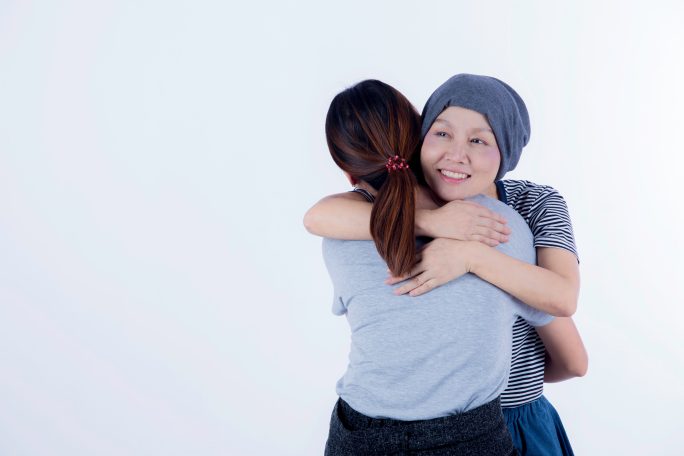“I don’t know what to say.”
How I longed to hear just this after being diagnosed with breast cancer. What I mostly heard were stories that weren’t helpful. From a patient’s point of view, they were hurtful. It’s natural to be at a loss for words, and it’s common to put your foot in your mouth.
When talking to a friend with cancer, don’t try to make yourself feel comfortable just by saying something. Maybe you can’t find the right words to say. It’s understandable. Instead, listen to the patient’s thoughts and feelings, and try to respond genuinely to them.
Avoid platitudes and clichés. Platitudes are commonplace expressions we’ve been taught by society. When faced with an uncomfortable moment and at a loss for words, you want so much to have something meaningful to say.
I heard all these when I was ill: “Things could be worse”, “You could be hit by a bus tomorrow”, “Everything happens for a reason”, “God doesn’t give you more than you can handle”, “You’ll be fine”. And my all time favourite, “At least you have a ‘good type’ of cancer” (yes, people have actually said this to me).
Clichés often have the opposite effect they’re intended to have. These are things like “Think positive thoughts”, “Science is on your side”, and “I know how you feel”.
Similarly, when you tell hopeful stories, they are often irrelevant to your friend because the situations are entirely different. Even if you believe the story is very similar to your friend’s circumstances, keep it to yourself.
I found that the person telling me the story often thought it was hopeful when it was actually very harrowing for me to hear. Sometimes, the stories related despair and had a nightmare outcome. For example, don’t tell the story of your Aunt who died from breast cancer.
As a general rule, saying the following things in particular should be avoided at all costs:
“Such and such had cancer and…” fill in the blanks. Understand that what happened to someone else is irrelevant.
“Such and such did this, you should do that too”. While you may be trying to sound positive, the implication to a cancer patient will be that they aren’t doing it right or aren’t trying hard enough.
“So and so had cancer, but she died”. Thanks a lot; I feel much better now.
“You probably got cancer because…” followed by all sorts of information meant to inform and fix the person who is ill. It’s natural to want to help, but don’t supply information or advice unless you’re specifically asked for it.
“Did you see that story about cancer on the news last night?”. This attempt at instilling hope in the patient is understandable, but a bit naïve.
Think empathy rather than sympathy. Not sure of the difference? Empathy is about feeling and understanding another’s feelings, having a connection. Sympathy is more feeling sorry for them, there’s no personal connection. Trust me when I say, a cancer patient doesn’t want you to feel sorry for them.
Even though you may not have experienced cancer yourself, there are ways of re-wording things. Tell your friend you will be there for them rather than “You will be fine.” Tell your work colleague that you look forward to their return rather than “Enjoy your time off.” Tell your friend you are available to drive them to treatment rather than, “Let me know if you need anything.” You get the idea.
What I’m saying is, simply think before you speak. Pretend that you’re on television and that there’s a five-second delay that allows you to erase what you were going to say, even if it means you say nothing at all. It’s okay to get it wrong and say something that doesn’t come out right. If you do, just apologise quickly, and move on.
Above all else, just be normal.
About the author:
Alyx Stewart is a speaker, author, app creator, food range developer, dragon boater and breast cancer survivor. Alyx has taken her experiences through breast cancer to improve the journeys of others going through a cancer diagnosis. For over seven years Alyx has developed tips and strategies to help friendships flourish through illness. Her app iCare4u helps people receive the help they need and has a global reach. Alyx also developed Kee-moh Snacks, a range of foods to help meet the nutritional requirements of people going through cancer treatment.







